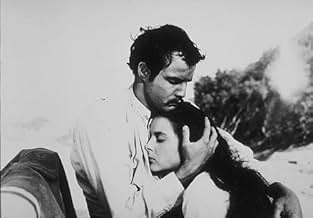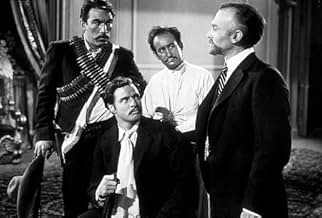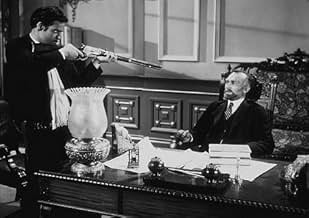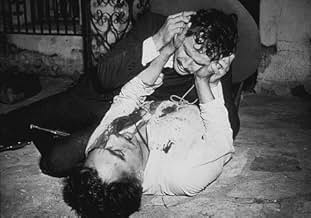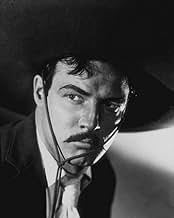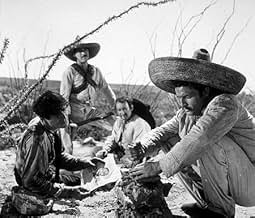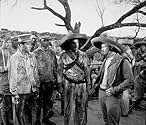The story of Mexican revolutionary Emiliano Zapata, who led a rebellion against the corrupt, oppressive dictatorship of President Porfirio Díaz in the early 20th century.The story of Mexican revolutionary Emiliano Zapata, who led a rebellion against the corrupt, oppressive dictatorship of President Porfirio Díaz in the early 20th century.The story of Mexican revolutionary Emiliano Zapata, who led a rebellion against the corrupt, oppressive dictatorship of President Porfirio Díaz in the early 20th century.
- Won 1 Oscar
- 5 wins & 9 nominations total
Rico Alaniz
- Guard
- (uncredited)
Daniel Armijo
- Undetermined Secondary Role
- (uncredited)
Ross Bagdasarian
- Officer
- (uncredited)
Salvador Baguez
- Soldier
- (uncredited)
- Director
- Writers
- All cast & crew
- Production, box office & more at IMDbPro
Featured reviews
The history of Mexico, our southern neighbor (and sometimes victim) is better known to American movie goers than the history of most countries.
You begin with the Maya (KINGS OF THE SUN), the conquest of Mexico (THE CAPTAIN FROM CASTILE), then to the founding of Father Serra's missions in California (SEVEN CITIES OF GOLD), and then the Spanish in the southwest and California (THE MARK OF ZORRO). Mexican - American history begins with the Texas War for Independence (THE ALAMO, THE LAST TEXAN, etc.). We skip to the French "intervention": JUAREZ and VERA CRUZ. Then we tend to skip the long reign of Porfirio Diaz.
Then comes the Mexican Revolution. The number of films that deal with the revolution is vast. But here are just a few titles: VIVA ZAPATA, VIVA VILLA, VILLA RIDES, THE OLD GRINGO (about Ambrose Bierce's probable death in Mexico's revolution), VIVA MARIA (a spoof but it touches on some issues), THE THREE AMIGOS, THEY CAME TO CORDURA (regarding the American Intervention under General Pershing in 1916), THE FUGITIVE (dealing with the anti-Catholic policies of the 1920s and 1930s), and even THE TREASURE OF SIERRA MADRES (when you see the business with Alfonso Badoya's bandit gang against the Federales).
The Mexican Revolution had many heroes. Many were heroes for one group but devils to another. Madero and Carranza stressed the need to have a nation that was loyal to a written constitution. Zapata would be one of the leaders of the land reform movement. Starting with Francisco Madero, going through Pancho Villa and Eufremio Zapata, going to their enemy Venusiano Carranza, to Obregon, Calles, and the great land reformer Lazaro Cardenas - the leadership was varied. The largest concentration of films is on the colorful (and murderous) Villa (a recent cable television movie was about Villa and his contract with D. W. Griffith to shoot a movie, AND STARRING PANCHO VILLA). But historians usually feel that while Villa tended to be on the side of the peasants, he had too much of the bandit in him to be a leader of the revolution's reforms. Zapata, on the other hand actually tried to reform the division of land. His work never got as far as he wanted before he was assassinated, but it was burned into the souls of the people from his region of Mexico (who still call themselves Zapatistas when involved in political protests to this day), and it did help set the stage for Cardenas' reforms in the late 1930s.
With direction by Elia Kazan and screenplay by John Steinbeck, VIVA ZAPATA is a wonderful, if simplistic view of the Revolution for American audiences. Brando underplays the lead for the most part - Zapata was not an explosive personality like Villa. Anthony Quinn is the explosive brother, whose more selfish attitudes leads to his own disaster. Of the supporting players, Alan Reed is good in his scene as Villa, where he discusses the future of Mexico with Zapata. Joseph Wiseman is properly sinister as an constant malcontent agent provocateur, insinuating each leader is too weak or unreliable to lead.
There are great set pieces - like Kazan's symbolic assassination of Madero by General Huerta's goons who drown out the little reformer/orator's voice as he tries to scream with a siren (but it makes the screams of the unheard martyr like a clarion call to Mexico).
Is it real Mexican history? Not quite - it is a version of it. But it is a really well done version of it.
You begin with the Maya (KINGS OF THE SUN), the conquest of Mexico (THE CAPTAIN FROM CASTILE), then to the founding of Father Serra's missions in California (SEVEN CITIES OF GOLD), and then the Spanish in the southwest and California (THE MARK OF ZORRO). Mexican - American history begins with the Texas War for Independence (THE ALAMO, THE LAST TEXAN, etc.). We skip to the French "intervention": JUAREZ and VERA CRUZ. Then we tend to skip the long reign of Porfirio Diaz.
Then comes the Mexican Revolution. The number of films that deal with the revolution is vast. But here are just a few titles: VIVA ZAPATA, VIVA VILLA, VILLA RIDES, THE OLD GRINGO (about Ambrose Bierce's probable death in Mexico's revolution), VIVA MARIA (a spoof but it touches on some issues), THE THREE AMIGOS, THEY CAME TO CORDURA (regarding the American Intervention under General Pershing in 1916), THE FUGITIVE (dealing with the anti-Catholic policies of the 1920s and 1930s), and even THE TREASURE OF SIERRA MADRES (when you see the business with Alfonso Badoya's bandit gang against the Federales).
The Mexican Revolution had many heroes. Many were heroes for one group but devils to another. Madero and Carranza stressed the need to have a nation that was loyal to a written constitution. Zapata would be one of the leaders of the land reform movement. Starting with Francisco Madero, going through Pancho Villa and Eufremio Zapata, going to their enemy Venusiano Carranza, to Obregon, Calles, and the great land reformer Lazaro Cardenas - the leadership was varied. The largest concentration of films is on the colorful (and murderous) Villa (a recent cable television movie was about Villa and his contract with D. W. Griffith to shoot a movie, AND STARRING PANCHO VILLA). But historians usually feel that while Villa tended to be on the side of the peasants, he had too much of the bandit in him to be a leader of the revolution's reforms. Zapata, on the other hand actually tried to reform the division of land. His work never got as far as he wanted before he was assassinated, but it was burned into the souls of the people from his region of Mexico (who still call themselves Zapatistas when involved in political protests to this day), and it did help set the stage for Cardenas' reforms in the late 1930s.
With direction by Elia Kazan and screenplay by John Steinbeck, VIVA ZAPATA is a wonderful, if simplistic view of the Revolution for American audiences. Brando underplays the lead for the most part - Zapata was not an explosive personality like Villa. Anthony Quinn is the explosive brother, whose more selfish attitudes leads to his own disaster. Of the supporting players, Alan Reed is good in his scene as Villa, where he discusses the future of Mexico with Zapata. Joseph Wiseman is properly sinister as an constant malcontent agent provocateur, insinuating each leader is too weak or unreliable to lead.
There are great set pieces - like Kazan's symbolic assassination of Madero by General Huerta's goons who drown out the little reformer/orator's voice as he tries to scream with a siren (but it makes the screams of the unheard martyr like a clarion call to Mexico).
Is it real Mexican history? Not quite - it is a version of it. But it is a really well done version of it.
I saw Viva Zapata 50 years ago, when I was 15. And all those years I hoped to see it again sometime. But in the Netherlands it's not available on VHS or DVD. I remember the great performance of Marlon Brando as Zapata. And how I hated Wiseman who played the ultimate traitor. In a magazine I read that Brando, before they shot the picture, spent several weeks in a remote Mexican village to learn the habits of the Mexicans, and he WAS a Mexican in the film! What a performer! I do hope to see once again some day! 9 out of 10.
Hans Dullaart Delft Netherlands.
Hans Dullaart Delft Netherlands.
This is a pretty good 1950's action/drama considering Elia Kazan had never before or never would again direct an action movie. It's almost like a Western except the setting is the second decade of the 20th century between the years of 1910-1919. Marlon Brando is Mexican revolutionary Emiliano Zapata in a role that earned him an Academy Award nomination. Brando is paired once again with Kazan who directed him the year before in A Streetcar Named Desire and would pair with him a couple of years later in Brando's Oscar winning performance in On the Waterfront. This film is well photographed by Mexican born cinematographer Joe Macdonald who should have been nominated for an Oscar but wasn't. In a rare role for Mexican born Anthony Quinn to be actually playing a Mexican as Eufernio Zapata for which he won the Academy Award for Best supporting Actor for 1952. Quinn's first nomination of four in his career and his first win of two. The film received three other nominations for Art Direction, Music and for it's John Steinbeck written Screenplay. This film is pure Hollywood however and is largely a fictional portrayal of actual events in it's romanticizing tale of one of Mexico's most beloved heroes Zapata. Despite the story by Steinbeck the dialog is weak. It's a good movie but Kazan is out of his element here, Brando is miscast and Steinbeck is lazy. I would give it a 7.5 out of 10.
Although in fact Emiliano Zapata never became president of Mexico, for the most part this is a pretty good account of the illiterate peasant who became a romantic revolutionary. For this portrayal in his third film Marlon Brando got a second Academy Award nomination for Best Actor, but lost to Gary Cooper for High Noon.
And as a film concerning the turmoil in Mexico during the teen and twenty years of the last century Viva Zapata! is far better than MGM's Viva Villa that starred Wallace Beery. Then again Marlon Brando is a much better actor.
One critical thing that was left out of the story is how much land the Roman Catholic Church held in Mexico. It was not just the rich Estancias that kept the masses in Mexico in peonage, the Church had a really big share of the real estate there. If the story were written today the Church's involvement would be shown. My guess is in the years of the Cold War and the height of Joe McCarthy, no one in Hollywood wanted to make a film that criticized the church in any way. But even a few years earlier the overreaction against the church was done in the John Ford film, The Fugitive which takes place within 10 to 20 years after Zapata died.
Zapata as played by Brando may be illiterate, but he is possessed of a simple eloquence and a charisma that made him a revolutionary figure, in the same manner Che Guevara became forty years later. He tries hard to hold to the ideals of the revolution, but finds as most do that tearing down a government is relatively easy, building one from scratch is a task that has defeated many.
Anthony Quinn plays Emiliano's swaggering brother Eufemio who's not quite as idealistic as Brando. Quinn received first Academy Award for Best Supporting Actor for the part. Quinn fills the screen with his bluster when he's on, it provides a perfect counterpoint to Brando's more idealistic role.
The guy who never gets praise for his performance is Joseph Wiseman. Wiseman, a product of the Actor's Studio in New York like Marlon Brando. This is a man whose type I've come across in numerous endeavors in my life, a professional stirrer of resentments. He's not happy unless there's some kind of battle going on. A type mind you that is ultimately dangerous for any movement. He intrigues for the sake of intrigue, but never accomplishes anything. It's a very good job by Wiseman, not often talked about for some reason.
Besides Quinn's Oscar and Brando's nomination, Viva Zapata! got Oscar nominations for Best Art&Set Direction for black and white film, Best music, and Best Screenplay. The last would have been a great honor for John Steinbeck, I'm not sure how many if any writers won a Pulitzer Prize, a Nobel Prize and an Oscar. That's three horse parlay that can't be beat.
For some reason Elia Kazan was overlooked for Best Director, possibly because he had won the year before for A Streetcar Named Desire.
Still Viva Zapata! is a work that stands up very well even with the historical inaccuracies.
And as a film concerning the turmoil in Mexico during the teen and twenty years of the last century Viva Zapata! is far better than MGM's Viva Villa that starred Wallace Beery. Then again Marlon Brando is a much better actor.
One critical thing that was left out of the story is how much land the Roman Catholic Church held in Mexico. It was not just the rich Estancias that kept the masses in Mexico in peonage, the Church had a really big share of the real estate there. If the story were written today the Church's involvement would be shown. My guess is in the years of the Cold War and the height of Joe McCarthy, no one in Hollywood wanted to make a film that criticized the church in any way. But even a few years earlier the overreaction against the church was done in the John Ford film, The Fugitive which takes place within 10 to 20 years after Zapata died.
Zapata as played by Brando may be illiterate, but he is possessed of a simple eloquence and a charisma that made him a revolutionary figure, in the same manner Che Guevara became forty years later. He tries hard to hold to the ideals of the revolution, but finds as most do that tearing down a government is relatively easy, building one from scratch is a task that has defeated many.
Anthony Quinn plays Emiliano's swaggering brother Eufemio who's not quite as idealistic as Brando. Quinn received first Academy Award for Best Supporting Actor for the part. Quinn fills the screen with his bluster when he's on, it provides a perfect counterpoint to Brando's more idealistic role.
The guy who never gets praise for his performance is Joseph Wiseman. Wiseman, a product of the Actor's Studio in New York like Marlon Brando. This is a man whose type I've come across in numerous endeavors in my life, a professional stirrer of resentments. He's not happy unless there's some kind of battle going on. A type mind you that is ultimately dangerous for any movement. He intrigues for the sake of intrigue, but never accomplishes anything. It's a very good job by Wiseman, not often talked about for some reason.
Besides Quinn's Oscar and Brando's nomination, Viva Zapata! got Oscar nominations for Best Art&Set Direction for black and white film, Best music, and Best Screenplay. The last would have been a great honor for John Steinbeck, I'm not sure how many if any writers won a Pulitzer Prize, a Nobel Prize and an Oscar. That's three horse parlay that can't be beat.
For some reason Elia Kazan was overlooked for Best Director, possibly because he had won the year before for A Streetcar Named Desire.
Still Viva Zapata! is a work that stands up very well even with the historical inaccuracies.
Mexico, 1909. The people in the state of Morelos rise up against the tyrannical regime of President Porfirio Diaz. They are lead by a simple, illiterate peasant-farmer, Emilio Zapata. All he wants is justice and fairness for his people but as things progress he is drawn deeper into a civil war where allies and enemies are often difficult to tell apart.
Written by John Steinbeck, directed by Elia Kazan, starring Marlon Brando and Anthony Quinn, and based on a true story, on paper this has all the makings of a classic. The end result, however, is far from satisfactory.
The intention was good: show the life of a man of integrity and honour and the lengths he is willing to go to for the rights of his people, throw in a theme of how power corrupts, plus another theme of how a name can sustain a revolution.
Can't fault the performances either. Brando, in his third movie, puts in a strong performance as Zapata. The movie provided him with his second Oscar nomination, after only three movies (his first was in A Streetcar Named Desire, his second movie). Anthony Quinn won the Best Supporting Actor Oscar in 1953 for his portrayal of Eufemio, Zapata's brother.
No, it is in the execution, especially direction and editing, that things fall a bit short of their potential. The story is clumsily told by Elia Kazan. Scenes don't link well, some scenes seem entirely unnecessary and it is difficult to follow the history behind the sequence of events. No explanation is given for the seeming lack of continuity, eg Zapata is President, all seems well, then next we know it is back to civil war with Zapata a revolutionary. No detail for the change provided.
This sudden change of direction, without the events that changed the direction, is incredibly jarring and disconcerting.
So, in the end, you have a historic story with many of the historic details left out. Not ideal.
Overall, okay, but not great. While Elia Kazan was a great director, I can't help but think this movie would have been a masterpiece if someone like John Huston, or maybe John Ford, had directed it.
Written by John Steinbeck, directed by Elia Kazan, starring Marlon Brando and Anthony Quinn, and based on a true story, on paper this has all the makings of a classic. The end result, however, is far from satisfactory.
The intention was good: show the life of a man of integrity and honour and the lengths he is willing to go to for the rights of his people, throw in a theme of how power corrupts, plus another theme of how a name can sustain a revolution.
Can't fault the performances either. Brando, in his third movie, puts in a strong performance as Zapata. The movie provided him with his second Oscar nomination, after only three movies (his first was in A Streetcar Named Desire, his second movie). Anthony Quinn won the Best Supporting Actor Oscar in 1953 for his portrayal of Eufemio, Zapata's brother.
No, it is in the execution, especially direction and editing, that things fall a bit short of their potential. The story is clumsily told by Elia Kazan. Scenes don't link well, some scenes seem entirely unnecessary and it is difficult to follow the history behind the sequence of events. No explanation is given for the seeming lack of continuity, eg Zapata is President, all seems well, then next we know it is back to civil war with Zapata a revolutionary. No detail for the change provided.
This sudden change of direction, without the events that changed the direction, is incredibly jarring and disconcerting.
So, in the end, you have a historic story with many of the historic details left out. Not ideal.
Overall, okay, but not great. While Elia Kazan was a great director, I can't help but think this movie would have been a masterpiece if someone like John Huston, or maybe John Ford, had directed it.
Did you know
- TriviaAnthony Quinn was very disappointed when Marlon Brando was cast as Emiliano Zapata - he thought that with his Latin appearance, he would have been a better choice. To solve the argument, both actors competed to see which of them could urinate furthest into the Rio Grande. Quinn lost the bet, but he won an Oscar for the best supporting actor as Zapata's brother.
- GoofsThe real Zapata never had a hands-on role in executions. While he would order the executions of close aides, he was never present as he could not bear to watch.
- Quotes
President Porfirio Diaz: These matters take time. You must be patient.
Emiliano Zapata: With your permission, my President, we make our tortillas with corn, not patience.
- Crazy creditsActress Mildred Dunnock is credited in opening credits but not in closing credits.
- ConnectionsFeatured in Cinefile: Marlon Brando, Wild One (1994)
Details
- Release date
- Country of origin
- Languages
- Also known as
- Viva Zapata!
- Filming locations
- Production companies
- See more company credits at IMDbPro
Box office
- Budget
- $1,800,000 (estimated)
- Runtime
- 1h 53m(113 min)
- Color
- Aspect ratio
- 1.37 : 1
Contribute to this page
Suggest an edit or add missing content


